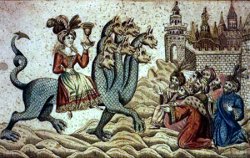
The Catholic Church is the whore of Babylon. So says one bizarre, outrageous myth common in some Christian communities. The roots of this come from twisted interpretations of Holy Scripture:
Then one of the seven angels who were holding the seven bowls came and said to me, “Come here. I will show you the judgment on the great harlot who lives near the many waters. The kings of the earth have had intercourse with her, and the inhabitants of the earth became drunk on the wine of her harlotry.” Then he carried me away in spirit to a deserted place where I saw a woman seated on a scarlet beast that was covered with blasphemous names, with seven heads and ten horns. The woman was wearing purple and scarlet and adorned with gold, precious stones, and pearls. She held in her hand a gold cup that was filled with the abominable and sordid deeds of her harlotry. On her forehead was written a name, which is a mystery, “Babylon the great, the mother of harlots and of the abominations of the earth.” I saw that the woman was drunk on the blood of the holy ones and on the blood of the witnesses to Jesus. When I saw her I was greatly amazed.
The relatively clear books of the Bible are interpreted in hugely different ways by various Christian communities. This is an obvious problem for those professing sola scriptura (the false belief that the Bible is EXCLUSIVELY the authoritative word of God and that it is somehow “self-interpreting”). The symbolism of Revelation makes personal, non-authoritative interpretation that much more difficult.
So, who is the harlot referred to in Revelation? Probably pagan Rome or apostate Jerusalem. That is what St. John may have envisioned when he wrote it and that is historically the view of Catholic (and many Protestant) theologians. (See the Further Reading notes below for a thorough exploration.)
To entertain that it could be the Catholic Church, one would have to believe that somehow this chapter slipped by Holy Mother Church’s attention when she canonized the Bible, that Sacred Tradition vanished and her authority ended at that moment. Also, that her own Apostle (and a first bishop) John indicts the Church created by Jesus himself in favor of “churches” to be created against unity 1,400 years later.
Those who believe that are indeed susceptible to wild tales spun by others (the Jack Chick tracts come to mind), while denying the need or existence of any true authority to interpret the Bible (unlike every other word ever written). None-the-less, these many clever story tellers implore you to interpret it THEIR way (which they insist is correct). Unfortunately, good people can be misled.
Unlike other communities, the Holy Bible comes from the Catholic Church… the Church does not come from the Bible. Remember that the Catholic Church canonized the Bible in the first place, a process that took about 400 years. What is and is not in the Bible, the order of the books, the numbering of the verses – everything. The Bible is the fruit of the Sacred Tradition of the Catholic Church. Of course, the New Testament writers themselves were Catholic as were all the Church fathers and Saints. Only the Church could select the content infallibly under the protection of the Holy Spirit who remains with her today and to the end of time. The Bible was never intended to replace Sacred Tradition or the authority of the Church. That notion did not exist for the first 1,000 years after the Bible was canonized. It was invented only then by self-appointed “reformers.”
Who started this Catholic church is the whore of Babylon myth? A Catholic man who broke his vows to the Church and God. A man who, alone and on his own authority, denied Sacred Tradition and the authority given by Jesus to the Church, with whom He is inseparable. A man who changed Holy Scripture to suit his evolving personal beliefs. A man who shattered Christian unity leading many to schism and heresy, who was followed by more men who built-on that with their own adjustments. The man was Martin Luther.
It was Luther who first made the association of the Catholic Church to harlot of Babylon and the Pope to the Antichrist in his angry attack On the Babylonian Captivity of the Church. Luther declares “I now know of a certainty that the papacy is the kingdom of Babylon.” (See also the Lutheran Book of Concord which continues this theme.)
The irony of this is that when Martin Luther removed (by first demoting) Tobit, Judith, Baruch, Wisdom, Sirach, and 1 & 2 Maccabees from his Bible, he wanted to go further but his political support base objected. On the chopping block were parts of Daniel, Esther, and all of James, Jude and Revelation. Yes – Revelation, the same book he drew on to attack the one true Church. Of Revelation he said that he could “in no way detect that the Holy Spirit produced it.” The complete Bible, unlike Martin Luther’s subset, remains unchanged from Saint Jerome’s Latin Vulgate translation in 397AD.
Today, the “whore of Babylon” myth is perpetuated and expanded (out of ignorance) by some Christian communities other than Lutherans. As you can tell, I am “down on the reformers” (particularly Luther) because of the long-lasting and deep damage they did to the Body of Christ. My view of Protestants, these many generations later, is however different than my view of their various founders. I was Protestant of a particular denomination because I was born into it, studied it, believed it. We were taught little about what other Christians believed. The same is true of many others in my denomination. The same is true of many in other denominations. The same is true of many Catholics. Once divided along these many branches, it is very difficult to restore the unity Jesus wants for His Church.
My children, I will be with you only a little while longer. You will look for me, and as I told the Jews, ‘Where I go you cannot come,’ so now I say it to you. I give you a new commandment: love one another. As I have loved you, so you also should love one another. This is how all will know that you are my disciples, if you have love for one another.”
No, the Catholic Church is not the whore of Babylon nor is the Holy Father, the successor in the Chair of St. Peter, the Antichrist. This is simply an anti-Catholic attack on the Church. Attacks we expect, but it is particularly sad coming from our brothers and sisters in Christ.
Further Reading:
- Jimmy Akins responds to anti-Catholic writer Dave Hunt in
“Hunt-ing the Whore of Babylon” part 1 and part 2 - Catholic Answers on The Whore of Babylon
- Catholic Answers on Hunting the Whore of Babylon



























George, this was very timely as there is a guy, Brandon House, who sells DVDs, with how the Catholic church will be the one world religion, and he has several pictures of PJPII with various religious leaders. I became very angry that he was attacking the one, holy, apostolic and universal church that he knew so little about. Thanks for posting this.
You know, it’s rather strange. I knew about Luther throwing out Revelation, and I knew about him identifying the Roman Catholic Church with the Antichrist, etc. But I “never put two and two together.” Thanks for pointing that out.
Actually, it’s the book of James he wanted to throw out, not Revelation.
Yes, James but others too including Revelation. There are a number of online sources covering this: Wikipedia, Debating Christianity, tquid.sharpens.org, CatholicEducation.org, and a lot more.
Jesus says ‘Blessed is the one who reads aloud the words of this prophecy, and blessed are those who hear, and who keep what is written in it, for the time is near.’ Revelation.
Each prophecy is explained and there is also a curse on anyone who adds or takes away from the prophecy. There is also the assessment of Jesus on each of the seven churches in Asia.
Many scholars think that the Catholic church is represented by the church of Thyatira. Those who tolerate the spirit of Jezebel in this church are warned to repent but the remainder are commended and the church is said to remain right up until the return. It is a timeline of the churches as well as a “type” of church.
The most commended is the church of Philadelphia (brotherly love) which is usually
thought to be the wesleyen spurgeon etc era when the Word of God was spread throughout the world.
The Jezebel spirit tries to hide the Word of God and cause the church members to tolerate sin. A worthwhile google.
This leans more toward a William Branham theory (and some other Protestant theologians) than Catholic teaching. A good resource to correctly understand Revelation is the Agape Bible Study. There are many other solid resources as well.
As to the condition of the Catholic church just prior to Luther you just have to google up what happened to Savonarola. Maybe if the church had listened to Savonarola there would have been no split.
Girolamo Savonarola was clearly a controversial figure, living under a bad pope. Like Luther, he was a Catholic priest. Unlike Luther, he tried to work within the Church. That Church is the Communion of Saints in the Body of Christ. We in the Church Militant are led by Our Lord’s vicar, just as He instituted the visible Church. Peter, the first pope, and all of his successors were sinners (some obviously much more so than others). This in no way invalidates the Church or justifies schism from the one true Church.
Dante Allegeri (popular writer in medieval Catholicism for his “Divine Comedy”) made remarks that some Catholic clerics reminded him of “the whore of Babylon.” I read his remarks recently. In Dante’s “Inferno,” he places some notorious popes in hell. This did not trouble the Church much. An entire graduate-level course was devoted to his Divine Comedy at Columbia University, taught by four professors of differing backgrounds. It was not anti-Catholic, though universities can be very liberal.
Now here is an idea which some Catholics have held–without adding any heretical doctrines, and it is perhaps worthy of examination. If everything Jesus said to Peter is symbolic, especially conferring of “the keys” (Matthew 16:19), what do we make of Jesus calling Peter “Satan” right afterwards in Matthew 16:23? After telling Peter that the Holy Spirit chose him and granting him the keys, Peter protested the Cross. So the next thing Jesus said to Peter was, “Get behind me, Satan! You are a stumbling block to me; you do not have in mind the things of God, but the things of men!” Matthew 16:23. Is it not possible that Jesus knew the “yeast of the pharisees” would triumph at times–even in the papacy? The Jews were also the only True Church at one point, and yet God called them a “prostitute” through the prophets at times. Jesus admitted “salvation is of the Jews,” yet called the pharisees of his day a “synagogue of Satan.” In spite of this, He told the people they “sat in Moses’ seat.”
The Scriptural”Beast” is always shifting to many manifestations of evil, and the term “prostitute” has been applied in various ways throughout Scripture. It has been used offensively against the RCC. Yet, there were always words of correction for God’s people rather than only praise. The history of the Church is not all holy, so why should all descriptions of it be? What would Christ say of popes like Alexander VI? Can you imagine Him calling such a one “Holy Father” after using that term for God Himself at the Last Supper? Christ ordered the apostles to be humble and not to “lord it over” the people, yet Church men said “That the pope is the only one whose feet are to be kissed by all princes?”–(Dictus Papae, pope Gregory VII) What about the triple Tiara and Royal Splendor of the papacy, including “gold, scarlet, and precious stones”? It is confusing, to say the least.
I ponder the fact the God never fed his earthly-church a diet of undiluted praise. If they bought offices, turned hypocritical, abused the helpless, and finally killed those sent to warn them,– He did not shrink from calling them “harlot.” If the RCC believes it should ONLY be called The “Spotless Bride” or “Holy Mother Church,” and never be chastised for it’s worldly defects (as the even the seven churches of Revelation were)–why? In Scripture, the spiritual Church after the Resurrection will be called the “Spotless Bride.” Where is any church still on earth called that in Scripture? And this can assume the primacy of Peter as the first pope.
I largely agree with your points!
The institutional Church is full of sinners (Romans 3:23), of course. Jesus heard this and said to them [that], “Those who are well do not need a physician, but the sick do. I did not come to call the righteous but sinners.” (Mark 2:17) Peter, the first pope as you correctly note was imperfect. He fell asleep at Gethsemane, he denied Jesus 3 times, his faith failed walking on water, etc. Every pope after him was also a sinner, yet many are also Saints. Note that popes go to confession like everyone else.
The Church does not say it should not be chastised for its worldly defects. It has often apologized. It has survived for 2,000 years in spite of its worldly defects, through the protection of the Holy Spirit (Matthew 16:18). ((Infallibility rises only to matters of faith and morals under very specific circumstances.)) Some of our members, up to and including the pope, have been infamous sinners. This side of heaven we are all sinners, so it is with the institutional Church – as Jesus well knew it unavoidably would be. It remains the living Church He created to lead us to heaven. The spotlessness of the Church does not rest with its members (see Lumen Gentium, chapter 5).
The respect that we show to the pope is first and foremost to his office, the Vicar of Christ, with the power and authority given to Peter and his successors by God. Any custom or title (e.g. Holy Father) reflects that respect but is not worship nor attestment to his personal holiness (although most were very holy).
I did not know that Luther wanted to truncate the canon even further and will have to look more into that. Regarding the Catholic Church, something that I see in Scripture is that the Lord, while acknowledging the order He put in place, has said multiple times that if those He calls do not answer, that He will go and find others. When the Pharisees went on about being sons of Abraham, Jesus said that God is able to raise up children of Abraham from the rocks. This is also seen in the parable of the banquet, where the master went out and brought in others when the invitees would not come; and also in the parable of the man who left His servants to tend to His affairs and finally sent his son, whom the servants killed. It’s seen in Revelation, where the Lord says that He will take away the lampstand of the churches that do not repent.
And so, I have wondered whether the Protestant Reformation was not actually God’s judgment upon the Catholic Church at the time. And the current distrust of and even attacks against could be seen as the fallout of that judgment. Yes, the gates of hell will not prevail against the Church, but history is long and we have not yet seen the end. It is possible for the Church to be victorious in the end, but battered and bruised in the moment. The exact same thing happened to Israel (“O My people, your leaders cause you to err”)–and while the Lord remained faithful to His promises to Israel, He also brought judgment against them for their sin, that they should repent.
So sometimes it seems that the Catholic Church focuses more on maintaining its status as the one true church, the victorious church, than it focuses on deep repentance for its errors and excesses.
To clarify my point a bit–I’m not sure that being the Church that Jesus instituted is what is determinative in God’s eyes. I don’t know, this is confusing a bit, as the Body of Christ is simply the Body of Christ and cannot truly be divided. I just see a clear theme in Scripture that it is the Lord who sets up authorities, but it’s not like being the authority the Lord set up means that you are right or pleasing to Him, or beyond His judgment. The Pharisees may have sat in Moses’ seat, but the Lord said that our righteousness must exceed the righteousness of the scribes and pharisees to make it in. But we are told to obey governing authorities in general and Jesus also told the people to do what the pharisees *said*, just not what they *did*. So I also wonder if there is spiritual safety in that. The judgment that comes upon unrighteous leaders is for them to bear. We, perhaps, simply need to submit to the order the Lord put in place.
Thank you Denise for your thoughtful comments.
Jesus could not expect perfection in His Church. Even Peter, the rock upon whom the Church was built, failed and disappointed our Lord several times. The Church’s authority can not and does not depend upon the flawless righteousness of its members but upon the protection of the Holy Spirit. Man’s relationship with God has varied over time as you note from the Old Testament. Our relationship is in the new and eternal covenant bought by Christ on the cross.
Billions of Catholics over 2,000 years have a history of many highs and lows. Throughout, the Church has been successful in steadfastly protecting the faith in spite of internal and external attack. Jesus promise can be trusted. When the Church fails institutionally, He does not replace it with another but fixes it. This happens continuously as it has from the beginning.
The Protestant Reformation (really Protestant Revolution) was not God’s work. Why, after 1,500 years, would He replace His Church with an endlessly growing number of alternatives all teaching as truth different things? Christ was very clear about 1 Church. The non-theological flaws of Luther’s time have long been addressed. There were no theological flaws, despite Luther’s need for new doctrine (e.g. sola scriptura) to fashion a framework outside of the Church.
We all are part of the Body of Christ through our baptism. That alone is insufficient for our salvation. Knowledge of the truth, living in accord with it and grace received through the sacraments is the surest path to eternal life.
I agree with your summary: “The judgment that comes upon unrighteous leaders is for them to bear. We, perhaps, simply need to submit to the order the Lord put in place.” The Lord’s judgment will be upon individuals, not His Church through which we know the order He put in place.
There is not enough eveidence to accuse the Catholic Church or the Pope in anyway.
All the modern religions have their own flaws and agendas.
I think some of it has to do with changes made to the Ten Commandments. The Catholics removed the original Second Commandment (forbidding idolatry). Then they shifted all the other Commandments over. And, finally, they split the original Tenth Commandment into two parts for Commandments 9 & 10 (covet neighbor’s stuff and covet neighbor’s wife).
I know, I know, I’m the antichrist for pointing this out. But do compare the two different versions of then Ten Commandments yourself before judging me.
I agree somewhat. Those of us in the Church are flawed and sometimes have agendas other than glorifying God. Only through the Holy Spirit has Christ’s Church been able to preserve the truth for 2,000 years (and will until the end of time as Jesus promised).
You do realize (I hope) that the commandments were not numbered when God revealed them to Moses. The content matters, not the numbering / grouping. Aside from numbering, Catholic and Protestant “versions” are the same. In the traditional Catholic form, the first is: “I, the Lord, am your God. You shall not have other gods besides me.” (Exodus 20:2-3) Worshiping anyone (including Mary and the Saints) or anything other than God is anathema to us as it is to you.
Now, I could argue that the traditional Protestant form “demotes” idol worship from the very first commandment to a subsequent (second) one, lowering its importance. That would be equally ridiculous!
You may benefit from reading the Catechism of the Catholic Church, which devotes over 120 pages to the commandments (beginning at paragraph 2052). Paragraphs 2112 thru 2114 address idolatry directly:
This is online here. If you prefer, Wikipedia discusses this as well.
No, my Sierra Vista friend, you are not “the Antichrist”for pointing this out”, just misled.